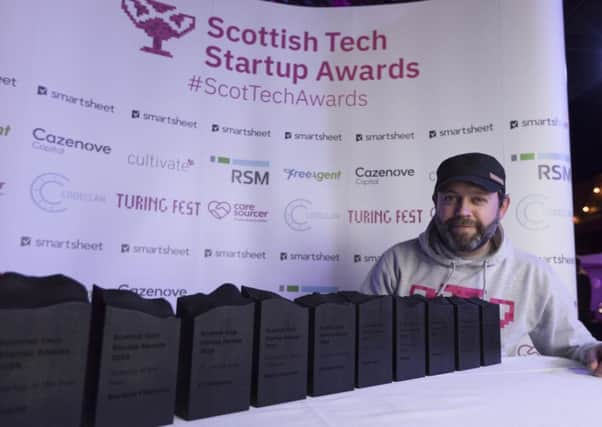Comment: The tech scene is connecting while it still can


“This is a bunch of people who are hugely important to the future of Scotland’s economy,” Brian Corcoran, chief executive and co-founder of tech conference Turing Fest, tells me, while we are standing at the bar at Edinburgh’s Central Hall.
But you probably wouldn’t recognise many faces until you heard their employers’ names. Administrate, CareSourcer, FreeAgent, Snap40 – all international success stories following in unicorn Skyscanner’s footsteps.
Advertisement
Hide AdAdvertisement
Hide AdThe Snap40 team is celebrating after two big wins: the healthtech has just scooped StartUp of the Year and B2B Company of the Year, hardly surprising given their $8 million (more than £6m) investment announcement earlier this year. Fintech platform Nucleus Financial, recently floated on the Alternative Investment Market, has been crowned ScaleUp of the Year, while accounting software FreeAgent’s Ed Molyneux was named CEO of the Year.
Corcoran and his team behind Turing Fest are expanding the brand tonight with the inaugural Scottish Tech StartUp Awards. Much like the education-focused tech conference, this is different. No three-course meal, no after-dinner speeches and a more than casual dress code.
“Well, no, there is no dress code,” he had warned me in advance. “We want people to be comfortable. We’re trying to create something for those in the tech start-up ecosystem. We knew if it was £150 a ticket, only the management team would come, and this is not a corporate-style event. Some people have bought tickets for their entire 15-strong team – we completely sold out at 530 people. It’s a party.”
It could be a case of party now while you still can, though. With the prospect of a no-deal Brexit looming, Corcoran is genuinely worried about the Scottish tech ecosystem.
According to digital technologies trade association ScotlandIS, 11 per cent of the tech industry’s talent comes from non-UK, EU citizens, a figure Corcoran calls “very conservative”.
“I wouldn’t be applying for a mortgage, put it that way,” he said. “I’m Irish, my wife is Scottish-Brazilian and our daughter was born here in Edinburgh. I’ve lived here for eight years but after 29 March will I still have the right to live and work here?”
He is already seeing the effect of the uncertainty among colleagues. Some software engineers have left their posts and others haven’t taken up job offers.
“Imagine the impact on Scotland if we lost a fifth of our tech workforce,” he says. When I admit I don’t really want to, he insists. “Well, we have to because that’s what we’re facing, not to mention the three million UK citizens living in Europe who might not be able to stay.”
Advertisement
Hide AdAdvertisement
Hide AdGiven the war for tech talent – those with the necessary software development and engineering skills required by fast-growing companies – this is a major bump in the road. It’s estimated there are only 20 million developers in the world, the equivalent of the population of Romania. I ask if it’s wise to get so many of them in the one room tonight. “Well, I’d say the benefits outweigh the risks,” he laughs. “There will always be competition and different coders suit different stages of business development so it’s natural that there’s movement in the market. You’ll notice not many people are talking business tonight…”
It’s true – they are too busy gathering teams for the real life video games and drinking at the free bar to consider moonlighting. Until you’re working in the sector it’s difficult to appreciate the openness and collaboration. Corcoran keeps using the word “ecosystem” and it’s an approach mirrored by Entrepreneurial Scotland and others in the space.
As a young industry, it is setting its own rules. Many of those at the top of the game, for examples, John Peebles, chief executive of training management system Administrate, make themselves very accessible. He gives half an hour a week to anyone who wants to talk to him and encourages his peers to do the same. The gap between the engineering and creative talent is closing as investors, founders, tech teams and organisations like Turing Fest work to bring everyone together.
The fact that so many of them support these awards, and are reinvesting their own profits into new start-ups, like Skyscanner’s Gareth Williams’ recent investment in fast-growing family messaging service Kindaba, shows the genuine desire to foster talent and learn from each other – even if that means a bit of swapsies amongst the staff.
“I think I’m most excited about seeing these companies get the recognition they deserve,” Corcoran concludes. “This is the first Scottish Tech StartUp Awards and hopefully, in 2023, winners will look back and see that the previous nominees have gone on to huge success. There will be some kudos attached to it. But for now, I just want to see everyone in this room in the limelight.”